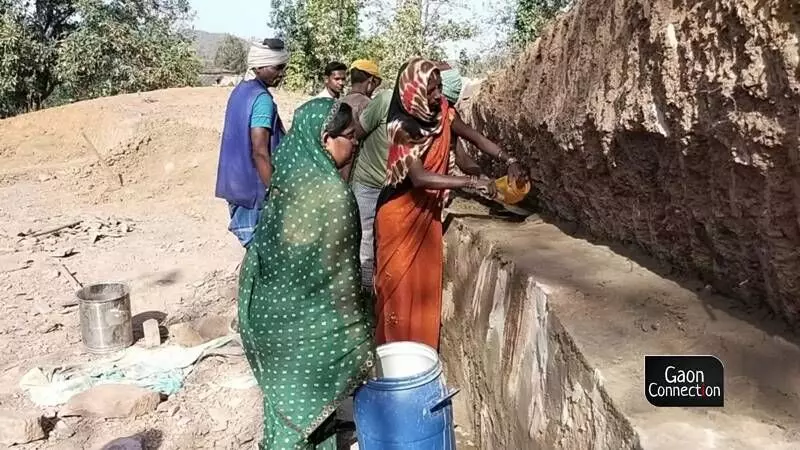'Mahila Mates' and Asmita app raise women's participation under MGNREGA in Sonbhadra
Launched a year ago to increase the participation of rural women in the national employment guarantee programme, the 'Mahila Mate' scheme in Uttar Pradesh has helped in providing better incomes to the rural women. In Sonbhadra district, half the labourforce is women.
 Brijendra Dubey 25 March 2022 2:08 PM GMT
Brijendra Dubey 25 March 2022 2:08 PM GMT
 All photos by Brijendra Dubey
All photos by Brijendra DubeySonbhadra (Uttar Pradesh)
Rashmi Singh, a 32-year-old former homemaker, had never thought it was possible to venture out of her house, find employment, and become an agent of change in her own village.
"The mahila mate scheme has raised my confidence and provided me with a respectable occupation which I could not have imagined," Singh, a resident of Agori village in Chopan town of Uttar Pradesh's Sonbhadra district told Gaon Connection. "Also, the accomplishment I feel after ensuring that unlettered rural women get livelihoods is something that is hard to express in words," she added.
Singh is amongst the 457 'mahila mates' in Sonbhadra district who are tasked by the state government to inspire rural women to join the workforce under the central government's Mahatma Gandhi National Rural Employment Guarantee Scheme (MGNREGS). The Mahatma Gandhi National Rural Employment Guarantee Act, 2005 is a national labour security act that aims to provide at least 100 days of guaranteed wage employment in a financial year to every rural household whose adult members volunteer to do unskilled manual work.
In a bid to raise the low participation of women in the poverty alleviation scheme of MGNREGS, the Uttar Pradesh government launched the Mahila Mate scheme in March 2021. The wage rate of a Mahila Mate is decided on the basis of the PWD circles, in Sonbhadra a mahila mate is paid Rs 400 a day for overseeing the works carried out by the women labour force under the MGNREGS. A Mahila Mate is deployed for a minimum of 20 workers at a work-site, if the number of workers reaches 40 then two Mahila mates can be deployed and so on.
As per the official in charge of administering the MGNREGS in the state, the mahila mate scheme has increased the women's participation in the MGNREGS.
"We felt the need to launch this mahila mate scheme as several states like Kerala, Tamil Nadu and Rajasthan were recording far better participation of women in the MGNREGS as compared to Uttar Pradesh," Yogesh Kumar, Additional Commissioner, Department of Rural Development in Uttar Pradesh told Gaon Connection. "It's been a year of this scheme and already the participation of women has increased from 33.59 per cent in 2021 to 37.22 per cent in 2022," he added.
Government records accessed by Gaon Connection show that in tribal-dominated Sonbhadra district itself, the participation of women in the rural workforce under the poverty alleviation scheme has increased from 47.78 per cent on March 31, 2021 to 49.90 per cent on March 22, 2022. This means half the labour force under MGNREGS in Sonbhadra is rural women.
Crossing the thresholds
At the Agori village of Sonbhadra, 30-year-old Kabootari Devi had never worked outside the confines of her thatched hut before she was motivated by mahila mate Rashmi Singh to work under MGNREGS.
"I was afraid of working outside the house… there was a strange fear about coming to the work site. But when the mahila mate came to help me, I found support as all my colleagues are women and there is a sense of overall security," Devi told Gaon Connection. She has eight members in her family.
"My husband also works here with me. I get paid two hundred and four rupees (Rs 204) for a day of work which is more than what I would have earned as an agricultural labourer," she said while mounting a basket of concrete mixture on her head.
Her neighbour Dhanraji Devi told Gaon Connection that rural women were happy about getting employment within and around their village which wasn't possible earlier.
"We used to go to far off places to work as labourers but mahila mate ensures that we get work here itself. As a result we get to spend more time with our families now. We are happier now," she said.
Tech support helps in training of mahila mates
The mahila mate scheme in Sonbhadra is assisted by non-profit Transform Rural India Foundation (TRIF). The organisation has developed a mobile phone application named 'Asmita' which not only helps in monitoring the scheme's implementation but also helps in its record keeping along with training these mates.
"A social platform for direct interaction with mahila mates has been developed as a knowledge hub which assists them in conducting their duties," Deepak Mathur, team lead, TRIF told Gaon Connection.
Yogesh Kumar, the official incharge of the MGNREGS in Uttar Pradesh echoed Mathur's remarks.
"This mobile application helps in filling the gaps which arise after these mates are trained by the government employees at the block levels. It also helps in smooth functioning of the scheme and helps us monitor the progress made," he said.
Talking about the challenges faced in expanding the scheme, Kumar said that there are socio-political issues which often impede the expansion of this scheme.
"Often the village heads (gram pradhans) are not happy with the appointment of mahila mates in a certain village. It affects the functioning of the scheme. But overall, I am happy that this scheme has helped in the increase in the participation of women in the MGNREGA," he said.
#MGNREGA labour law #ruraldevelopment
More Stories




